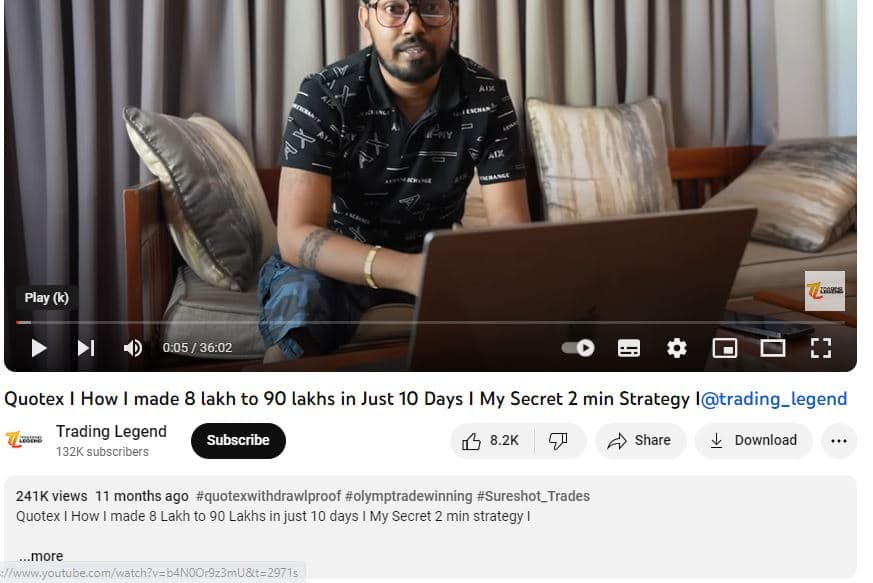



Finfluencers are actively marketing unauthorised products/platforms that facilitate trading in forex derivatives, which could lead to investors facing a penalty of up to 3x their capital or even face imprisonment for violating the Foreign Exchange Management Act (FEMA).
This, despite the platforms being on the Reserve Bank of India's Alert List, which gives the names of platforms that are enabling forex transactions without authorisation. Moneycontrol has reached out to them and the article will be updated if and when they respond.
Also read: SAT sets aside Sebi order restraining IIFL Securities from onboarding clients for 2 years
Social media handles such as Trading Legend (with over 1.32 lakh subscribers and run by Tapas Kumar Mohanta), Sigma Binary Trading (with over 2.06 lakh subscribers) and Dr Mukul Agrawal (with over 1.46 million subscribers) promote electronic trading platforms (ETPs) that facilitate binary options trading.
Binary options trading involves taking a bet on how the price of an underlying asset - forex, commodities, stocks or cryptocurrency - moves in a given time frame. For example, a person can place a bet on whether USD/INR will fall to 82 within a few seconds or minutes, and if the movement goes your way, you make a profit.
Indian regulations allow resident citizens to undertake forex transactions, even through ETPs, but only through authorised ones. Platforms such as Quotex and Pocket Options, though heavily advertised, are not authorised. In fact, they appear on the RBI's non-exhaustive list of unauthorised ETPs.
But influencers promote these platforms promising 1,225 percent return in 10 days…

...and sometimes even 2,00,100 percent returns.

In February 2022, the Central Bank had taken cognisance of such unauthorised ETPs offering forex trading facilities to Indian residents and about people losing money through such ETPs.
Then the Central Bank added a more serious warning.
It stated: "Resident persons undertaking forex transactions for purposes other than those permitted under the FEMA or on ETPs not authorised by the RBI shall render themselves liable for penal action under the FEMA."
Vaibhav Kakkar, Senior Partner at Saraf and Partner, said, “These transactions would be seen as trading in forex derivatives using unauthorised platforms and as per FEMA, only transactions through authorised electronic trading platforms are permitted.”
He added, “These transactions could also be seen as money laundering transactions, to the extent that the payouts are done outside of the normal banking channels, thereby potentially attracting penal provisions under FEMA and anti-money laundering laws.”
According to Suhana Islam Murshedd, Partner, AQUILAW, “The general penalty under FEMA would be attracted i.e. penalty of up to 3x the sum involved and imprisonment which may extend up to five years. This will apply to a retail investor as well as the intermediary platform in case the latter is unauthorised.”
With the recently issued Section 37A of FEMA, authorities also have the power to seize equivalent amounts of assets in India, even though the gains are made outside India in contravention with exchange-control regulations, said Kakkar.
Kakkar added that, in terms of priority, “the focus of regulator and enforcement authorities remains towards taking strict actions against the platforms and entities operating the platforms, compared to resident individuals”.
Finfluencers promoting these platforms may be penalised under the Sebi (Prohibition of Fraudulent and Unfair Trade Practices) Regulations read with section 12A of the Sebi Act, according to Murshedd. While registered advisors could lose their registration and face a fine of up to Rs 1 crore, unregistered advisors could face the fine, said AQUILAW’s Murshedd.
Money trail
Influencers seem to be earning referral incomes. Their typical strategy is to claim that they made these exhorbitant profits and then promise a "sureshot" strategy or some such strategy enticingly named.
Then, on their free Telegram group, they announce that they will share these strategies with people who open an account on that ETP and share their ETP account details. Such people would be given access to their 'premium' group.
Though a person can try these ETPs via the free demo mode, the finfluencers will encourage people to try the 'live' mode--which involves transferring money to the platform and getting 'trading capital'.
To transfer money to such platforms and make withdrawals, often crypto platforms such as Binance are used, which allow people to convert rupee into crypto coins and back.
Whatever money is transferred is converted into trading capital because these platforms do not charge any processing or 'brokerage' fee.
Unscrupulous business
How do they make money?
That's the insidious part. Though finfluencers entice people with the promise of huge profits, the chances of making losses on these platforms are much higher.
Why?
Nithin Kamath, the Co-founder of Zerodha, had explained this in a long post in December 2020.
Binary options trading is a form of contract for difference (CFD) instrument. CFDs allow a person to take exposure to any asset across the world. As Kamath explained, if a person wanted to buy the stock of a company based out of the US, then he/she can only do that through a brokerage that is registered in the US. But an India registered brokerage could do a workaround - if the brokerage had an account with a US-based brokerage, it could buy the shares through its proprietary book.
It would take the money from the client, of course, and make a ledger entry in the client's name, but that would be between the client and the broker, with no other regulated intermediary.
The ledger entry or the contract with the client would be called CFD, explained Kamath. The brokerage would earn on the small difference between the price of the share (or any other underlying asset) on the CFD platform and the price of the share in the US market.
In the beginning, therefore, brokers merely acted as go-betweens.
Over time, brokerages realised that most of these clients were getting their bets wrong. So, the brokerages thought a better idea would be the counter-party; that is, without actually buying the underlying asset, they would take the opposing position. So if a client wanted to buy, the brokerage would take the 'sell' position and pay the difference as the contract expired.
The arrangement was so profitable that the brokerages started offering high leverage.
Also read: Sebi releases standard framework for calculating Net Distributable Cash Flows for REITs and InvITs
Fictitious regulator
If a user does make an occasional profit against the norm, and he/she finds it hard to make a withdrawal, it will be near impossible to find legal recourse. These platforms are not registered in India and are not governed by any Indian regulatory body. Promotional content for these platforms try to win over investor confidence by saying that these ETPs are regulated by the International Financial Market Relations Regulation Center (IFMRRC), which has been listed as a fictitious regulator by the US Securities and Exchange Commission (SEC).
People can register their complaints through the National Cyber Crime Reporting Portal (https://cybercrime.gov.in), where all manners of cyber crimes can be reported, which will then be taken up by the local police force. People could approach the local police stations directly or file a complaint with the Enforcement Directorate (ed-del-rev@nic.in).
Discover the latest Business News, Sensex, and Nifty updates. Obtain Personal Finance insights, tax queries, and expert opinions on Moneycontrol or download the Moneycontrol App to stay updated!
Find the best of Al News in one place, specially curated for you every weekend.
Stay on top of the latest tech trends and biggest startup news.